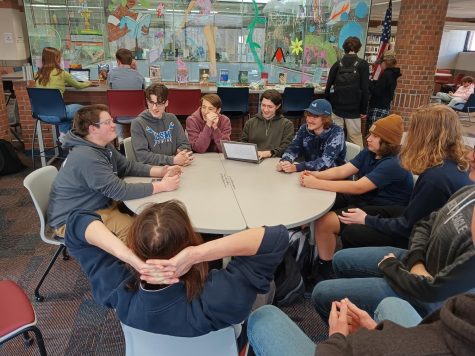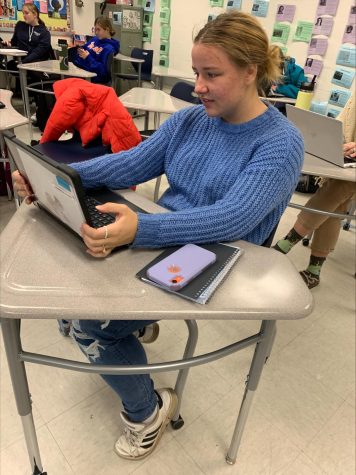Earbuds? Check. Wifi? Check. Focus? Wait… what were you saying?
January 11, 2019
Students often complain that they can’t watch the newest Netflix original or use Spotify on the school wifi – but is this a bad thing? Some people claim that having something to listen to while they work helps them focus, and that they do better work this way. Nonetheless, according to multiple studies done by universities around the country, trying to multitask like that is almost always harmful to the student’s final product.
According to research done by Ohio State University, watching a television show while studying makes the person feel “emotionally satisfied,” but it does not improve the student’s performance – and may actually hinder them. Watching TV does not actually help the student focus in most cases – instead, all it does is make the work more entertaining. Students might also be tempted to stop doing their work to watch whatever is on at the time, and having this type of distraction has the potential to make completing work or studying more tiring than usual.
I know personally that this has happened to me too many times to count, so now I only listen to the shows that I watch while trying to get work done. It’s much less distracting to only be hearing the action, although listening to dialogue for extended periods of time might sometimes make you write the wrong word. When you have a bunch of flashing lights in your peripheral vision, it’s much harder to focus on the black text on a white background that is popular with a lot of word processing software like Word or Google Docs and books. Even though watching TV while you study doesn’t appear to have any benefits, what about music? Isn’t listening to Mozart supposed to make you smarter?
If you want the short answer: no, listening to Mozart will not actually make you smarter. Besides that, music will most likely reduce a student’s capability to focus on the task at hand. However, there are some special cases – Dr. Masha Godkin of Northcentral University found that classical music with a slow tempo has the potential to help students maximize learning. The truth is, though, that nobody going to Lewis Mills will go on to Spotify to put on some Vivaldi to listen to while they work. Dr. Godkin recommends music without any lyrics or a catchy beat, but most music that’s popular with our generation has both those elements. Most people will put on music of a genre they usually enjoy, instead of actively seeking out some of Beethoven’s work. Because of this, it is highly unlikely that having Spotify available to students will actually have any kind of benefit. All this data has to do with watching or listening to things while trying to get work done, though. What about when students have a study hall and already did all their homework?
Unfortunately for students, watching television on school days for more than a couple of hours on a school day can cause students to do worse in school, according to a study done by Dr. Iman Sharif of Children’s Hospital at Montefiore in the Bronx. Being exposed to R-rated movies or excessively violent TV shows before the recommended age can also worsen the negative effects that watching TV on a school day has. Watching non-violent TV on the weekends has no effect, however, so students can watch all of the programs that fit into that criteria all they want in their spare time on Saturday and Sunday. This leads to another common occurrence, though: bingewatching. Students will initially log onto Netflix just to watch a single episode of their favorite show, but before they know it hours will have passed and they no longer have any time to do their homework. The same thing could happen in study halls – especially during a long-block study hall. Fortunately for students, listening to music doesn’t appear to have these types of negative effects. You can listen to as much music as you want in your free time and still be fine. This might support a case for having music-streaming services unblocked, but there are plenty of reasons why that shouldn’t be allowed to happen.
You can’t trust students to not use music streaming services at inappropriate times. I can’t tell you how many times I’ve seen students that had to be repeatedly told to take their headphones out, so giving access to music streaming services to the entire school population would most likely only increase the frequency of these occurrences. Not to mention, the sheer amount of bandwidth that apps like Spotify use is already high enough when it’s just one person using the service. If you were to multiply that by the maybe 20 students using it at one time, it might have a chance to cause slowdowns. Netflix would only be worse for the network – if it couldn’t handle every PLD logging in at once earlier in the year, it certainly wouldn’t be able to handle a bunch of students using Netflix at the same time. Allowing such content to bypass the filters would be detrimental to the school.
While I would love to be able to do whatever I want on the school wifi, I realize that this is unrealistic and would only hurt me in the long run. I know I could fall too easily into Netflix’s trap, and spend every single study hall just watching movies. I think it’s a good thing that there are at least some restrictions, because it helps people like me who have little self-control by enforcing some mandatory self-control. Other students might not see it this way, but it has probably helped them stay more productive than they would’ve been had they also had Netflix on while writing their paper.


